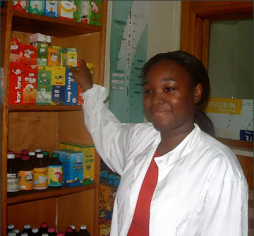Imagine buying drugs to cure malaria, only to find that the ineffective medicine contains a mixture of chalk and starch. Or imagine taking counterfeit birth control and finding yourself pregnant, or getting inoculated for meningitis -- as was the case with 2,500 people in Niger -- and finding that the vaccine was deadly.
Counterfeit drugs abound in the developing world. Although estimates vary, somewhere between 10 and 25 percent of all drugs sold in third world countries are fakes. Some countries -- like Nigeria -- have rates of fake drugs in circulation that are approaching 80 percent. A research team in Ghana is now developing a new way to fight counterfeit drugs with an equally ubiquitous tool -- the mobile phone.
Ashifi Gogo is one of the founders of mPedigree, a solution to the growing problem of counterfeit drugs. Gogo calls mPedigree a "big dreaming startup" that has the goal of saving lives. Although the project is still brand new -- the first trial will start in about three weeks -- its founders have big dreams for the ability of mobiles to control the proliferation of counterfeit drugs in developing countries. "Buying medicine here is like Russian roulette," said Gogo. "I don't want people to have to choose between a drug that's safe and more expensive and a drug that's cheap and not genuine. Those choices shouldn't be there."
Although Ghana has a fairly high rate of illiteracy -- 42 percent of people in the country can't read or write -- Gogo says that even people who are illiterate are able to use the mPedigree service. "You'd be amazed at how many people who don't know how to read or write use cell phones," he said. "There's something magical about cell phones that just makes sense on a human DNA level. People just embrace them here." However, Gogo says they may also experiment with voice short codes, which will make the system even easier to use for illiterate users.
Gogo says that mPedigree has a good relationship with the Ghana Food and Drug Board, which has helped to get the project off the ground. Already the recipients of a grant from the National Collegiate Inventors and Innovators Alliance, mPedigree is looking for other grant funding. Gogo says that working in Ghana hasn't always been smooth sailing -- the Ghanaian business environment tends to work much slower than that in Northern countries.
Although the project has started small, the mPedigree team isn't afraid to dream big. Their short term goal is a to get a consortium of drug providers to sign onto the program. He says the mPedigree system offers a corporate responsibility program for drug companies who don't have a current plan, something he hopes will be an attractive offer to manufacturers in Africa. In the long term, mPedigree hopes to spread the program to Nigeria and Mozambique, and then to other parts of Africa and the developing world.
Despite the challenges of implementing this still fledgling project, Gogo says that his work with mPedigree has been immensely rewarding. "It's fun!" he said. "It just feels so good doing this work."
Photo credit to mPedigree.


Post new comment